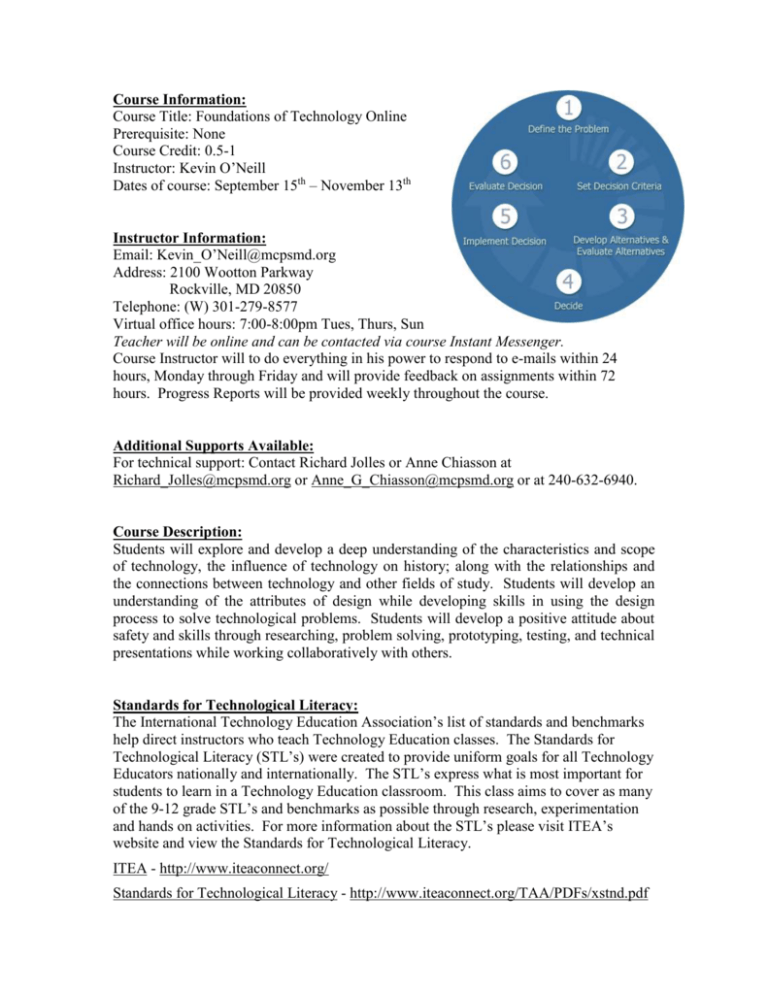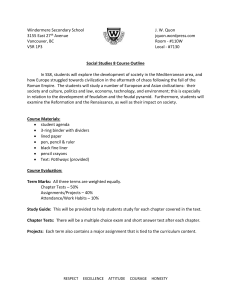FOT Syllabus - eLearning Solutions
advertisement

Course Information: Course Title: Foundations of Technology Online Prerequisite: None Course Credit: 0.5-1 Instructor: Kevin O’Neill Dates of course: September 15th – November 13th Instructor Information: Email: Kevin_O’Neill@mcpsmd.org Address: 2100 Wootton Parkway Rockville, MD 20850 Telephone: (W) 301-279-8577 Virtual office hours: 7:00-8:00pm Tues, Thurs, Sun Teacher will be online and can be contacted via course Instant Messenger. Course Instructor will to do everything in his power to respond to e-mails within 24 hours, Monday through Friday and will provide feedback on assignments within 72 hours. Progress Reports will be provided weekly throughout the course. Additional Supports Available: For technical support: Contact Richard Jolles or Anne Chiasson at Richard_Jolles@mcpsmd.org or Anne_G_Chiasson@mcpsmd.org or at 240-632-6940. Course Description: Students will explore and develop a deep understanding of the characteristics and scope of technology, the influence of technology on history; along with the relationships and the connections between technology and other fields of study. Students will develop an understanding of the attributes of design while developing skills in using the design process to solve technological problems. Students will develop a positive attitude about safety and skills through researching, problem solving, prototyping, testing, and technical presentations while working collaboratively with others. Standards for Technological Literacy: The International Technology Education Association’s list of standards and benchmarks help direct instructors who teach Technology Education classes. The Standards for Technological Literacy (STL’s) were created to provide uniform goals for all Technology Educators nationally and internationally. The STL’s express what is most important for students to learn in a Technology Education classroom. This class aims to cover as many of the 9-12 grade STL’s and benchmarks as possible through research, experimentation and hands on activities. For more information about the STL’s please visit ITEA’s website and view the Standards for Technological Literacy. ITEA - http://www.iteaconnect.org/ Standards for Technological Literacy - http://www.iteaconnect.org/TAA/PDFs/xstnd.pdf Hardware and Software Specifications: Your computer will need Microsoft Office or a PDF writer. A digital camera or scanner is strongly recommended. If you don’t have either, speak with your instructor about alternatives. Microsoft Draw, Paint or some other image editing software is recommended. Familiarize yourself with some web searching tools for research purposes. You will also need the following plug-ins. If you don't have them, click the links to download the appropriate FREE browser plugins: Flash player - http://www.adobe.com/products/flashplayer/ Adobe Reader - http://www.adobe.com/products/acrobat/readstep2.html Materials List: Required: Cups – Can be disposable or not Marble or other small ball Aluminum Foil Plastic Container or Medicine Bottle with Lid Chocolate, Marshmallows and Graham Crackers Suggested: Foam Core or Poster Board Paper Clips Tape – Masking, Scotch, Packaging, Duct or other String Popsicle Sticks or Tongue Depressors Washers Rubber Bands Fabric Plastic Wrap Colored Pens and Pencils or Markers Hot Glue Gun and Glue Sticks Construction paper Drinking Straws Card Stock Index Cards Coffee Stirrers Fan Ruler or Yardstick Scale Foam Blocks Cardboard Elmer’s Glue Plastic Bags Mirrors Academic Honesty: By accepting a seat in an online course in Montgomery County Public Schools (MCPS), you also accept responsibility to uphold the academic honesty and intellectual integrity that MCPS has established. The word “cheat” is defined by the online Cambridge dictionary as “to behave in a dishonest way in order to get what you want”. When working online, students must maintain the highest level of academic honesty in order to master the content and attain the intended level of intellectual development from the course. Each individual student is responsible for his/her decision-making in regard to academic honesty. Method for Submitting Assignments: In this online course there are multiple ways to submit an assignment. Some assignments maybe be brought to and submitted at one of the face to face sessions. Most assignments will be submitted through the course dropboxes or discussion boards. You can access the dropboxes and discussion boards at anytime to submit and complete assignments but you should be sure to submit them before the established due dates and deadlines. The typical due date for this class will be two days after the lesson is assigned. Deadlines for most activities are midnight Sunday of the week that they are assigned. Check the course calendar for details and be sure to check the submission procedure for each assignment. In compliance the with MCPS grading policy, assignments submitted past their due date will be considered late and will suffer a 10% grade deduction and assignments will not be accepted after the deadline. Expectations for Participation: Good time management skills are a must for online success. Different assignments will require different levels of participation as well as different amounts of time. Staying up to date and planning ahead will ensure you have plenty of time to complete your assignments. Students are expected to visit the site daily during the week and are advised to sign on during the weekend too. Keep up with the course calendar as well as the due dates and deadlines for each assignment. Check e-mail often and respond to e-mail from the course instructor promptly. You may also be required to work on assignments in a group. You should respond to e-mails from your group members promptly as well. On most group work assignments each group member will be assigned a role and responsibilities. You MUST work with you group to complete any group assignments. Attendance at all face to face sessions is mandatory. Grading: The FOT online course is divided into two semesters. Each semester grade is a combination of the student’s class grade and exam grade. The class grade counts for 75% percent of the semester grade and the final exam is 25%. The course gradebook is broken up into 4 categories each accounting the following percentage of the class grade: Discussions 20% Assignments 30% Projects 30% Assessments 20% Discussions are usually worth around 20 points for each discussion. They usually require an original post made by each student and one or more reply post to a classmate. Remember that in order to earn all available points, your responses need to be meaningful and spark interest--do not simply say "I agree.” Some discussions may require attachments to your posts. Rubrics should be provided for each. Assignments each have their own individual point value. They maybe submitted to either dropboxes or discussion boards. Follow the directions for each assignment closely to earn full credit. Rubrics should be provided for each. Projects are usually completed using a design folio and are submitted to a dropbox. Design-folio templates are usually provided and include their own grading rubric within the template. Follow the rubric and complete all steps of the project to earn full credit. Assessments are quizzes at the end of each lesson. The quizzes test the students on the information and concepts presented in the lesson and may refer to assignments in the lesson.








